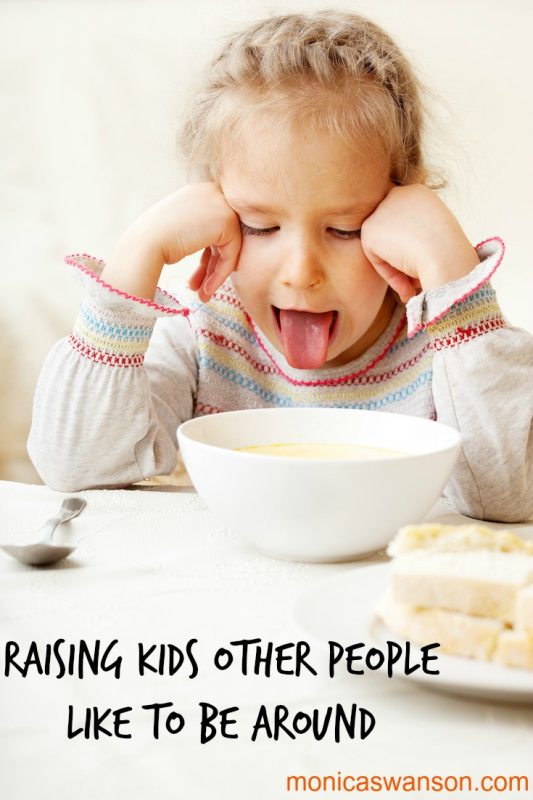Kids and Manners. {Raising kids other people like to be around}
We all love our own kids, quirks, bad-behavior and all. They’re our own flesh and blood, and we know their sweet side, so it’s easy to overlook their more, well, annoying sides.
But when it comes to being around other people…you know, socializing, it is a good idea to hone in on our kids’ behavior a bit. I mean, I hate to sound old fashioned, but manners still matter. It’s about making other people comfortable. Or, maybe a better motivation is simply: Keeping our friends.
We’ve all been in social situations around those kids–whether they’re three or thirteen — who make us cringe. They are whiny or fussy, or constantly interrupting. They might be needy tweens, or sulky teens. They make us uncomfortable, and make it hard to enjoy a visit with friends.
Then there are other kids who are actually enjoyable to be around. They don’t interrupt (or if they really need to, they do it politely) and they obey their parents quickly. They don’t act like the world revolves around them. They entertain themselves, and if they’re old enough — they add to conversation, showing interest in others.
We’ve all been out at restaurants or other public places to witness a child-centered scene that makes everyone uncomfortable. Often these moments give me great compassion for the parents, who might be trying their best to contain the situation. (and most of us have been there a time or twelve before.) But other times you wonder if the parents even notice their own kids and how their behavior is affecting everyone around them. And we’ve also witnessed kids with great manners that you just stop to watch because it’s so refreshing to see.
Since you probably now can’t help but think about your own kids, and which category they fall into, let me be clear: No condemnation here. Though there’s a few families out there who have this behavior thing nailed, most of us are somewhere in the middle. A work in progress. We might have seasons of success and seasons that stink, or (in some of our cases–) a few kids that make you proud, and then one or two that keep you humble.
And hopefully we want our kids to behave well, not just because they are acting, (there’s nothing worse than a phony kid, right? Anyone else old enough remember Leave it to Beaver’s Eddie Haskell?) but because it is an overflow of their heart. We want to raise kids who want to be a blessing. Kids who actually care about the people around them. (and here’s a crazy idea–kids who are happy to see their poor parents finally have a little social life, thankyouverymuch.)
So though this is too big a topic for one little blog post, I’ll start here with just four things that I think can really help us to raise kids who other people like being around. Kids who you are proud to share with the world.
- Set standards of behavior. Parents: This is your job. Our kids should know what is expected of them in various situations, and increasingly as they grow up. They should know what is expected when they meet someone new…When they are at someone else’s home, or have guests in their home. Kids need to know that interrupting is rude and inappropriate, (or if there is good reason to interrupt, how to do it right) and how to handle it if they dislike the food they are served. Of course your preschooler will not have as high of standards as your ten (or sixteen) year-old, but all of them are capable of following a set of standards. Older kids should know that regardless of how they feel, they should always make people around them feel comfortable and appreciated. (I don’t need to mention cell phones here, but yes, those too.) The only way to do this is to communicate expectations clearly, and revisit the topic as often as necessary.
- Talk about WHY. Kids are always more likely to cooperate when they understand a WHY behind what you ask of them. You can explain to your kids that you want people to feel comfortable in your home. You can tell them stories of experiences when you have felt welcomed in a home because of how you were treated by the hosts (and perhaps the hosts’ children.) If you’re out in public places, you can talk about how other people are trying to enjoy their time and how you can help other families have a nice time. You can remind them that as they grow up people will want to include them in cool things if they have good manners and add joy to social settings.
- Practice. A great way to prepare your kids for social settings is to practice ahead of time. Before you have guests over, tell your kids what is going to happen, and let them practice anything that you know will help the time go more smoothly: greeting the guests, (show me a smile, and eye contact!) and offering to get them something. Practice how to handle it if they need to interrupt. It isn’t fair for kids to be caught off guard, so talking about things before they happen is reasonable and helpful. (also the thing I tend to forget the most!) Before you go out to dinner, or to a public place, you can review good manners, and even practice how that will look. Of course this is trickier as they get older, (which is why I recommend developing these habits young) but you can still talk your teenager through things. “Our family will be going to this event, and this is the standard of behavior I expect of you…” Why not shock your guests by having your teenager happily clear the table and start the dishes? How long has it been since you sat around and enjoyed chatting after a meal with friends?
- Discipline accordingly. If we are setting standards of behavior for our kids in this way, then we should also be ready to give consequences when they blow it. I bring this up especially because if your kids are like
my six year oldsome that I know, they might actually consider social settings as an opportunity to get by behaving badly. They think they’ll get by with murder because you’re too busy or distracted to deal with them. Oh but no. Let’s not go there. (My kids have learned the hard way…) If you cannot deal with it in the moment, then I suggest finding time as soon as you can to deal with the behavior. Again–letting them know this rule before you’re in the moment is our best chance at a positive experience.
I know you guys: None of this is easy. Trust me — lazy parenting is so much easier, and I have certainly done that more than I am proud to admit. But if we take kids’ behavior seriously, and we realize the long-term ramifications of it– positively or negatively — we should be motivated to work at it now.
They’ll thank you later.
(And your friends might just invite you back again too.)
Continue this conversation in comments? Share a story or anything you’ve done to motivate or train your kids to behave well around others. We all learn from each other here which is one of my favorite things about this blog!
And if this post encouraged you, please share it with your friends using social media buttons.
A few recommended BOOKS on the subject of manners:
*Thanks to my Facebook crew for recommending many of these:
Don’t Behave Like You Live in a Cave (Laugh & Learn)
Dude, That’s Rude!: (Get Some Manners) (Laugh & Learn)
How to Behave and Why
Protocol Matters: Cultivating Social Graces in Christian Homes and Schools
Goops and How to Be Them: A Manual of Manners for Polite Infants Inculcating Many Juvenile Virtues, etc.
Girls and boys book of etiquette,
*These are affiliate links–which means if you click-through and purchase a few cents of each purchase will go to support my work here! Thank you!
With Aloha,
Monica




Just a general thank you, Monica. I have 3 boys younger than yours, and I so look forward to my two days off each week when I can read your blog while I eat my breakfast. You inspire me to do better, and when I try to be intentional, parenting (and marriage) is so much more FUN!!!
Greetings from cold, gray Michigan, and blessings to you!
Becky
Oh Becky, thank you so much. That really means a lot to me and I do love the idea of having breakfast with you and bringing a little sunshine to your days. Keep up the great work and thank you for taking the time to comment! Aloha! 🙂 Also: Yay for three boys!!!
Really great article. Our son is 14 months and starting to catch on to a lot of things but we also don’t expect too much out of him, yet. This is all great to remember as he grows. Thanks!
Love this! It looks like this every day in our house because my youngest has autism (Aspergers, if they were still diagnosing that) and he has to be prepared for EVERYTHING. I never thought about practicing “manners” but really that’s exactly what we were doing! No wonder so many people think my oldest has such excellent manners – so much practice 😉 Of course the hard part of living with autism is that it is impossible to predict, plan, and practice for every situation that could possibly arise. And when those unexpected ones hit, we’re the family dragging our screaming 8 year old out of the store/restaurant/party that you are politely pretending to not see.
But let me be the first to agree: practicing works! It sounds (and sometimes feels) a little stupid but that first time that something happens that you prepared your kids for and they react well? It’s not JUST that you feel like a million bucks and winner of parent of the year. The kiddos are so much more comfortable and confident. Double score!
THANK YOU Becka!! What a great example and I love that you are already doing the practicing! Oh I have so much admiration for you–bless you! I imagine life is never dull there…:) Thanks for the examples and I promise I’m cheering for you if I were the one seeing you out and about!! Aloha!
I am extremely proud of my children’s manners, especially when others notice and comment. I make sure to relay the praise to my children, if they weren’t there to hear it, and explain that why I am so proud of them. Currently we are moving to the next level with my sons- trying to help them join in the conversation when appropriate. Sometimes they are sitting quietly around the table , but appear bored. I’m working on teaching them that joining the conversation is another way to show good manners and welcome others into our home. My youngest still whispers things into my ear that he wants me to say. I think he is old enough to politely join in.
As a teacher, I am always impressed with the students who say please, thank you, and excuse me on a regular basis. We started with the simple rule of saying thank you every single time ANYONE hands you ANYTHING and moved on from there. It worked, so far…
SO GOOD Shannon! Thank you for commenting! Love all of that. Well done. 🙂
Thanks Monica! Great article – one for us to remember when Anita is a little older!
Of course Elaine–My pleasure….And I’m not sure if I have officially congratulated you on Anita! So exciting and you will do a great job raising her with wonderful manners I am sure. 😉 XO
Oh my, this is a good one. I must say the ‘practice’ part is the least liked. To be honest, I hated taking my kids out with me to dinner, movie, or places they had to be ‘quiet’ or sit still. My oldest two kids were rather tame. It’s my youngest two that like to ‘play’ at the table, goof off, say jokes etc. It makes going out with them more work for me than I’d like. We still take them out, but I am seriously considering finding a live class to take them to. Thanks for sharing, great post.
Love this Monica! So important! If I made add the benefit of parents modeling the behaviors we want to see in our kiddos. Please and thank you goes a ling way even when setting limits😄. Havea great day!!
super good point, Kelli –thank you for adding. Indeed–modeling is probably the most important thing we can do. Much aloha and have a great weekend! 🙂